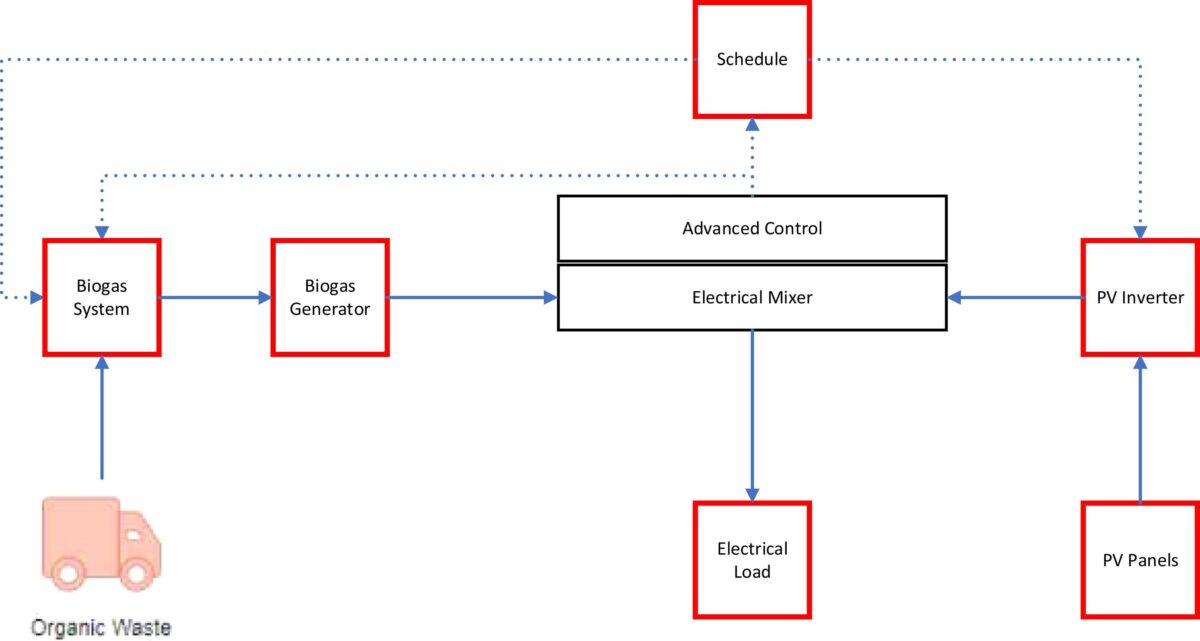A group of researchers from the United Arab Emirates (UAE) and Lebanon designed a novel hybrid PV and biogas production system for applications in residential buildings.
According to its creators, the proposed system can help the energy crisis that Lebanon experienced in the last few years, when several hundreds of megawatts of off-grid PV systems were deployed in the country.
“Lebanon has been experiencing an economic crisis since 2019, which has had a substantial impact on multiple industries, particularly the fuel and energy sectors,” the group explained. “Consequently, the Lebanese population has come to adopt renewable energy technologies, such as PV systems, as their primary source of electricity generation. Nevertheless, these systems rely on unpredictable weather conditions, resulting in a deficit of power during nighttime and the winter season.”
The novelty of the hybrid system lies in its prediction component, which foresees the share of the demand that can be supplied with PV. Then, it calculates in advance the waste demand necessary for the biogas system to compensate for the lack of PV generation.
For the prediction of PV generation, the system uses existing machine-learning techniques from previous literature. Then, this capacity is compared to the projected load, which is based on the requirement of the specific user. When PV generation is greater or equal to the expected load, the system runs only on it. However, when there is insufficient solar power, the proposed system checks if the available biomass type and quantities are sufficient to support the deficit. In case there is not enough waste, a diesel system runs as a last resort.
“The system will examine the dimensions and capacity of the biogas digester, as well as the anticipated biogas duction, which is determined by various combinations,” the academic group said. “Three forms of manure are being considered: cattle, swine, and poultry. Percentage of ash, volatile and fixed carbon within different types of food residue are also considered.”
The proposed model was then implemented in a simulation based on the demand of a real high-capacity manufacturing operation that works in an eight-hour cycle. It has a PV system of 100 kW consisting of 182 PV panels of 550 W each. A weather dataset was used for PV generation estimates, considering sunshine, humidity, and wind. In addition, the paper assumes that the biogas power generator has an instantaneous power capacity larger than the load.
“The data collected for each four seconds during daylight hours in January is used,” the group explained their analysis results. “The number of occurrences where hybrid collaboration is required is shown to be of around 6,840 and the external generator is never used. However, the PV system succeeds in providing the required energy for around 5,650 occurrences.”
The tests showed that, on the first 15 days of January, 3.4 tons of beef-type manure were needed to support the system and generate 143.83 cubic meters of methane. However, the machine learning calculation resulted in a methane shortage of 11.664 cubic meters compared to the actual results. It was able to learn from its mistake, and in the following simulated year, the error for the same period dropped from 12.82% to 8.28%.
“The case study and simulation sections collectively highlight the importance of the proposed equations and control sequence in facilitating precise data evaluation and driving efficiency enhancements,” the academics concluded. “This demonstration serves to emphasize the valuable contributions of the paper to the current industry knowledge.”
The system was presented in “Hybrid photovoltaic and biogas system for stable power system,” published in Next Energy. The study was conducted by scientists from the UAE's University of Wollongong in Dubai and Lebanon's Rafik Hariri University.
This content is protected by copyright and may not be reused. If you want to cooperate with us and would like to reuse some of our content, please contact: editors@pv-magazine.com.



By submitting this form you agree to pv magazine using your data for the purposes of publishing your comment.
Your personal data will only be disclosed or otherwise transmitted to third parties for the purposes of spam filtering or if this is necessary for technical maintenance of the website. Any other transfer to third parties will not take place unless this is justified on the basis of applicable data protection regulations or if pv magazine is legally obliged to do so.
You may revoke this consent at any time with effect for the future, in which case your personal data will be deleted immediately. Otherwise, your data will be deleted if pv magazine has processed your request or the purpose of data storage is fulfilled.
Further information on data privacy can be found in our Data Protection Policy.